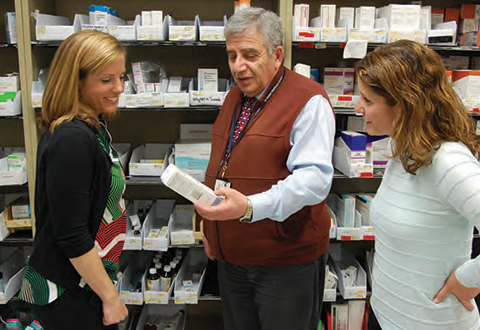VA New England Healthcare System
New, Better Treatments for Hepatitis C

(L) Michelle Baytarian, PA-C, MMSc, Liver Clinic Coordinator, Lead Hepatitis C Clinician, Lead Physician Assistant, discusses the latest medication in the VA Boston pharmacy with Tony Houranieh, RPh, MS, PhD, Associate Chief of Pharmacy, Clinical Services Co-Chair, VA Boston IRB and Rayhme Collins, PA, GI Service.
It's a severe, potentially life-threatening liver infection that has a particularly high incidence in our Veteran population. And, many Veterans don't even know they have it.
It's Hepatitis C, and it often has no symptoms, allowing it to go undetected for many years. By then, irreversible damage to the liver may be done. Left untreated, it can lead to liver failure, liver cancer, and even death.
Past problems with treating hepatitis C
Treatment for this serious disease has been met with a number of obstacles in the past. Getting patients to the doctor to get tested is one issue, especially if the person has no symptoms. But, perhaps more important, the older hepatitis C treatments had a number of severe side effects that were difficult for many to live with. In addition, the medications had to be taken for a year. And for those who completed treatment, a cure wasn’t guaranteed, and often didn’t happen. These problems led to an epidemic of hepatitis C patients who either didn’t want to get tested or, even if they did, couldn’t tolerate the treatment.
New treatments today
Fortunately, huge strides have been made in hepatitis C treatment - and the newest treatment modalities are offered in VISN 1. The VA now has access to state-of-the art medications that have a low rate of side effects and only need to be taken for 12 weeks for a majority of patients. And perhaps the best part: they’re extremely effective, with a high cure rate for many patients.
What you can do
Testing is voluntary, and is done through a simple blood test. Talk with your doctor about your risk factors.
“There’s an estimated 6,000 Veterans have hepatitis C in VISN 1,” says Michelle Baytarian, PA-C, MMSc, Lead Hepatitis C Clinician, VA Boston HCS. “We’ve treated 30 percent of them in the last three years with these new regimens, and plan on continuing treating until every possible treatment candidate has been cured.”
“We have the best hepatitis C treatments available to our Veterans today - and we are striving for a 100 percent cure rate,” adds Tony Houranieh, RPh, MS, PhD, Associate Chief of Pharmacy for Clinical Services at VA Boston. “We want Veterans to know that we have the cutting edge resources to successfully treat them, and they’re totally different from the drugs used even just five years ago. Veterans need to take the first step by going to their doctor and discussing the screening. If you get screened, you can get treated - and ultimately, get cured.”
















